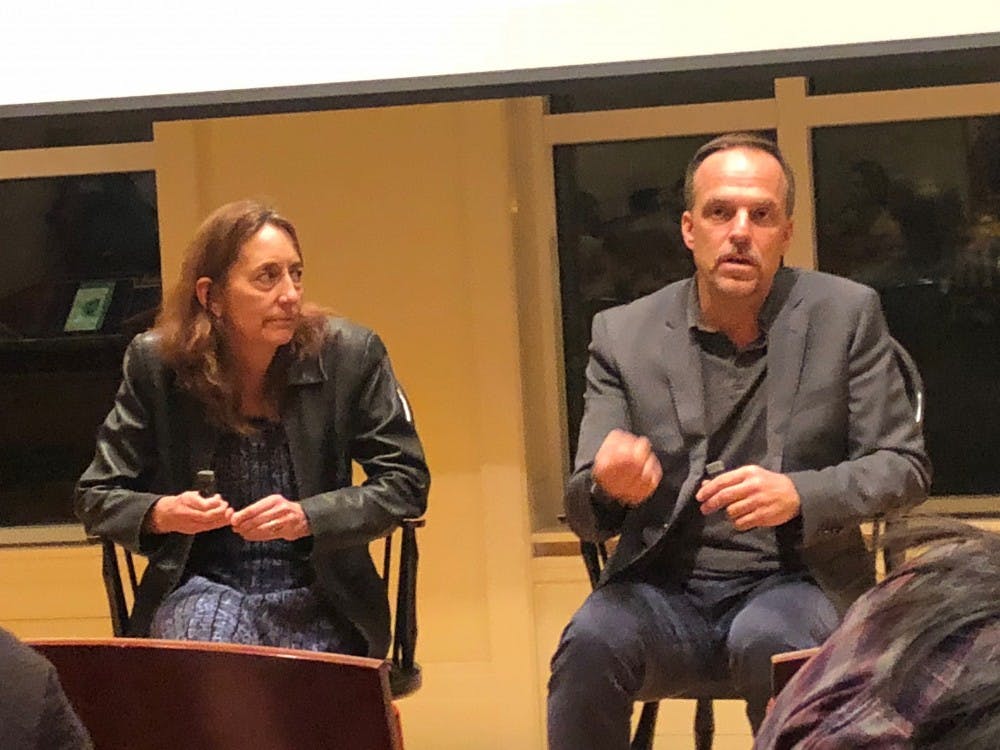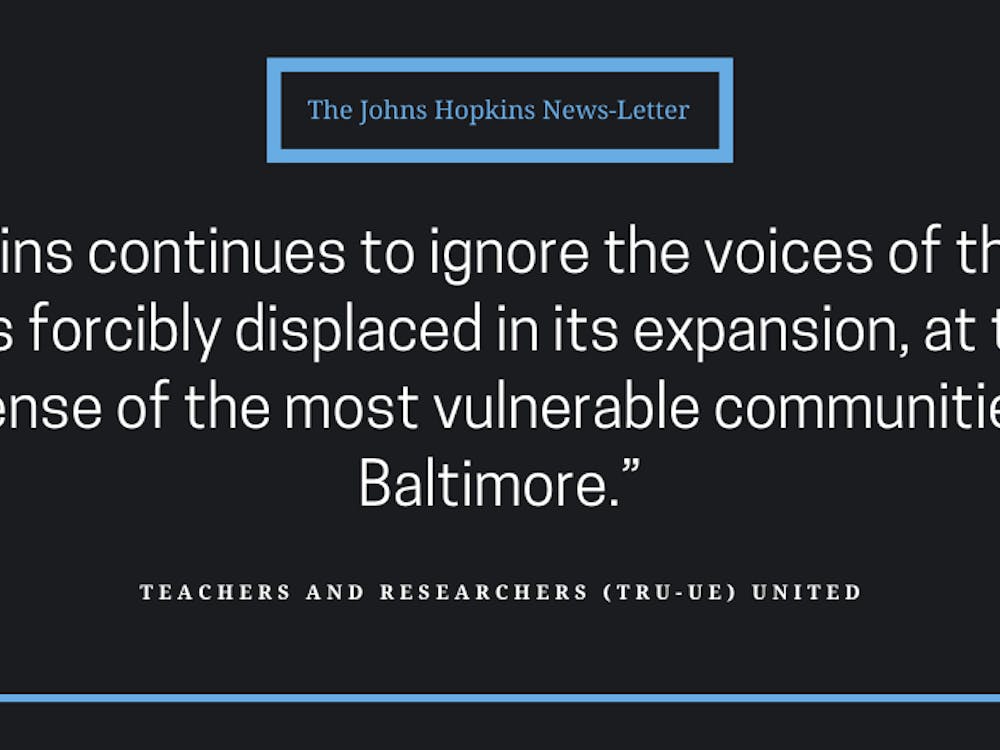Hopkins alumni Greg Asbed and Laura Germino received the 2018 Anne Smedinghoff Award at the final event of this year’s Foreign Affairs Symposium (FAS) on Tuesday. Asbed and Germino are internationally recognized for their human rights work, and last year Asbed received a MacArthur “Genius” grant.
In 1993, Asbed and Germino founded the Coalition of Immokalee Workers (CIW) to address human rights violations experienced by migrant workers in Immokalee, Fla.
Asbed explained that workers on agricultural farms in Immokalee faced workplace harassment, sexual assault and forced labor at their work sites. Many were unable to escape these inhumane conditions due to wage theft and the threat of physical violence.
“Florida, until very recently, was called ground zero for modern day slavery,” Asbed said.
FAS granted them the Anne Smedinghoff Award in light of their work fighting international human rights abuses. The award honors Anne Smedinghoff, a Hopkins alumna and former FAS director, who was killed in a suicide bomb attack in 2013 while delivering books to schoolchildren in Afghanistan.
Germino explained that they created the Fair Food Program (FFP), which seeks to improve the job conditions of farm workers throughout the country.
As part of the initiative, farm supervisors submit to regular FFP audits of their workers’ job conditions. If they fail these checks, they are banned from selling their products until they address the issues. Workers educate one another on their rights and can safely report misconduct when these rights are violated.
Several international corporations, including Taco Bell, Walmart and McDonald’s, have signed onto the FFP in the last decade.
According to Germino, they prosecuted several farm supervisors but sought a solution to prevent misconduct before it occurred.
“You cannot prosecute your way out of the problem,” Germino said. “If you’re cleaning up an abuse after it already happened, that’s not a success. You actually have to get to prevention.”
Germino presented a video clip from CNN’s Freedom Project series about the FFP.
In the video, Alejandrina Carrera, a migrant worker, describes being sexually assaulted by her supervisor when she was 14. After she resisted and another worker stopped the assault, Carrera and the other worker were both fired.
She stated that at the time, migrant workers were not well educated in workers rights and often accepted the conditions that they worked in. Carrera now works at an FFP farm and appreciates the change in how she is treated on the job.
“You’re not going to be harassed, you’re not going to be insulted, you’re not going to be forced to work,” Carrera said in the video. “There’s more respect now.”
The program has farms in many states, including Florida, Georgia and Maryland.
“Outside of these zones, it still resembles today what Alejandrina talked about in the video of past years before the Fair Food Program took place,” Germino said.
Asbed questioned whether attendees would purchase fruit from a stand in Maryland where they saw workers being abused by their supervisor. When no one in the room raised their hand, he said that most people are empathetic and would never purchase if they saw these injustices in person.
“We buy from the companies that do and that turn their back on those conditions every single day,” he said.
Asbed said that this indirect support from consumers is why 80 percent of women who work in the field report having been harassed.
Asbed described the process of growing the grassroots program into a nationwide initiative. Initially, the coalition encouraged workers to strike. Asbed believed that workers did not know their power.
Yet, when they went on strike, the majority of workers returned to work within five days. He realized that the agricultural industry had rendered workers powerless.
“No one has enough of an income to have the kind of safety net you need to stay home,” he said.
He realized that the coalition was approaching the systemic problem in the wrong way. Asbed stated that the power was not within the workers, who were replaceable to growers, but with the consumers, who controlled market demand.
The coalition flew across the country from Florida to California to protest Taco Bell’s support of farms with poor working conditions.
Taco Bell became the first major company to sign into the FFP. McDonald’s and Burger King, as well as several other multi-billion dollar companies, joined the initiative in the following years.
Asbed explained that when Carrera fought against her supervisor’s sexual assault attempt, most workers would rather have endured abuse than risk getting fired for speaking out.
“Today, it’s an entirely different equation,” Asbed said. “Under the Fair Food Program, women don’t have to worry about complaining and losing their job.”
He stated that under the FFP, a farm supervisor would rather fire the employee who assaulted the worker than lose the business of some of the world’s biggest corporations.
About 35,000 workers are protected under the FFP in the United States. However, he said that this number is not enough considering the total 1.5 million workers in the agricultural industry.
Wendy’s, Costco and Kroger are among the major food companies that have not joined the FFP.
Asbed explained that Wendy’s purchased produce from Florida farms before the FFP began. After consumers condemned them for supporting the poor conditions of Florida’s workers, the company began to buy from Mexican farms. According to Asbed, the conditions at these farms are even worse.
Germino said that they had seen real results with the program.
“We’re preventing the human rights violations that have existed for so many decades, centuries, really,” Germino said.
However, she said that they were looking to expand to help workers across the country and around the world.
Sophomore Turquoise Baker, a member of the FAS marketing team, said she was surprised by the severity of the exploitation. She added that she had not realized it was happening in Maryland.
“I was not aware of the situation in Baltimore,” she said. “Most of what I have heard of migrant workers and the exploitation that occurs on farms and assaults has mostly been in the South and a few places in the Midwest. But Maryland I had no idea about.”
Baker encouraged people to come out to meet speakers and learn about topics that they are neither comfortable nor familiar with.
Computer Science graduate student Channing Kimble-Brown thought that the FFP is an effective way to handle a systemic problem, something that she thought was unusual.
Kimble-Brown said that she was not fully aware of the working conditions faced by workers in the agriculture industry.
“There’s always a lot of awareness being raised,” Kimble-Brown said. “But this was an actually systemic solution that actually worked and was in practice.”























Please note All comments are eligible for publication in The News-Letter.